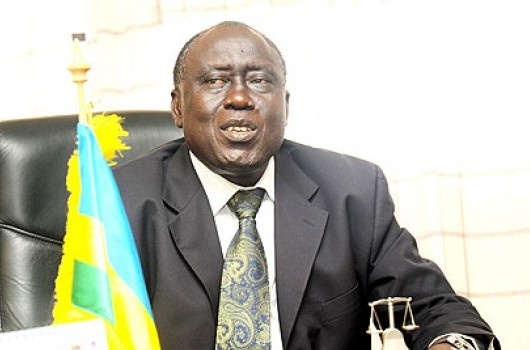ICTR betrayed Rwanda says Rwandan justice minister
Justice Minister Tharcisse Karugarama has said the International Criminal Tribunal for Rwanda’s refusal to let the
country host records of trial proceedings constitute a betrayal.
Karugarama, who said the trial records are an integral part of Rwanda’s history, told the United Nations General Assembly on Wednesday that ICTR has failed to serve its cause.
The ICTR was established in 1995 to try masterminds of the 1994 Genocide against the Tutsi.
However, according to Karugarama, most of the masterminds of the Genocide are still at large and the biggest beneficiaries of ICTR have not been survivors of the Genocide or the country in general, but rather the technocrats running the ICTR apparatus.
“Technocrats running the ICTR system have denied Rwandans the right to host the archives, which constitute an integral part of Rwanda’s history. For some obscure reasons, they have denied the Rwandans the right to own their own history. Rwanda feels betrayed by this kind of attitude,” said Karugarama.
He was addressing a UN General Assembly meeting called by president of the assembly, Vuk Jeremic, on the ‘Thematic Debate on the Role of International Criminal Justice in Reconciliation.’
This was the first ever debate on the role of the international criminal justice system in reconciliation, with its president stressing the vital part it must play not just in looking back on past atrocities, but in bringing former foes together to build a better and more inclusive tomorrow.
The minister also said he finds it “frustrating” that despite the existence of correctional facilities such as the one where prisoners from the Special Court for Sierra Leone, are incarcerated in Rwanda, the technocrats running the ICTR system have denied Rwandans the right to host Genocide convicts, instead sending them to other countries such as Mali.
“This has frustrated survivors who feel that the ICTR does not value them. On the contrary, trials under Gacaca judicial system (the home-grown legal initiative), the perpetrators of the Genocide or their families were brought together with the survivors of the Genocide to collectively examine all aspects of the Genocide and punish those responsible for it. This gave chance for national healing and reconciliation,” he added.
ICTR and Gacaca compared
Figures show that in 10 years, the Gacaca courts spent about $52m (about Rwf33b) to try close to two million cases of Genocide, while the ICTR spent $1.5b (about Rwf1 trillion) to hear 75 case in 17 years.
Over time, the operations of the tribunal have been questioned, for varying reasons. First, by having Genocide suspects among its staff, some of whom ended up being indicted by the same tribunal; the sentences that have been deemed too lenient by some, and the high acquittal rate.
The ICTR is also accused of failing to arrest some of the key fugitives they indicted, including Genocide financier Felicien Kabuga; Protais Mpiranya, who headed the notorious presidential guards; and ex-Defence minister Augustin Bizimana.
“The time and cost of the trials at the ICTR in comparison to the trials in Rwanda demonstrate how, in the eyes of the Rwandan survivors, reconciliation cannot be achieved on the basis of international justice,” said Karugarama.
In his criticism of the UN-established systems, Karugarama said the international criminal justice is in a crisis of credibility with regard to fostering national reconciliation in post-conflict situations.
“Neither the tribunals set up to address the issue nor the application of the principle of Universal Jurisdiction has succeeded in that objective. Hence, there is a need to review what we have achieved over the last two decades and chart a way forward for the future,” he said.
The UN General Assembly chief, Jeremic, said the big question is how international criminal justice can help reconcile former adversaries in post-conflict societies.
Meanwhile, the development comes at a time when Serbians are bitter over the recent International Criminal Tribunal for the Former Yugoslavia’s acquittal of Croat Generals Ante Gotovina and Mladen Markac, who were initially convicted of purging ethnic Serbs in 1995.
New York Times

